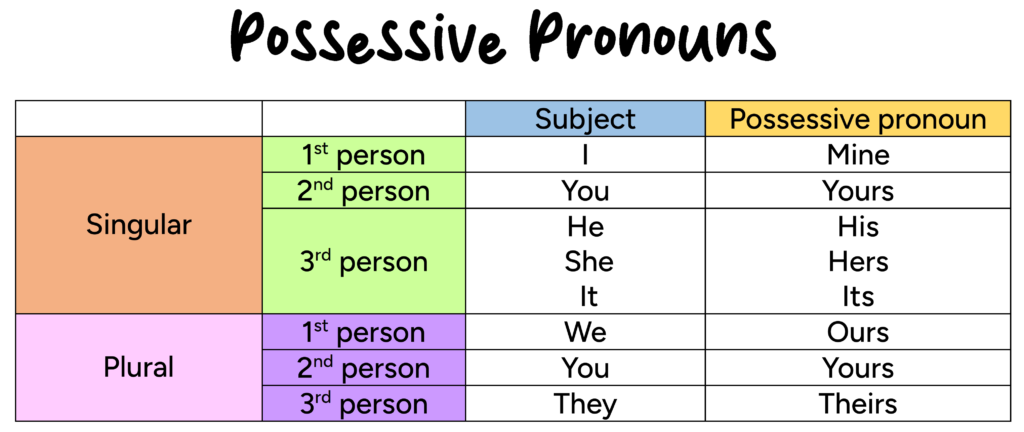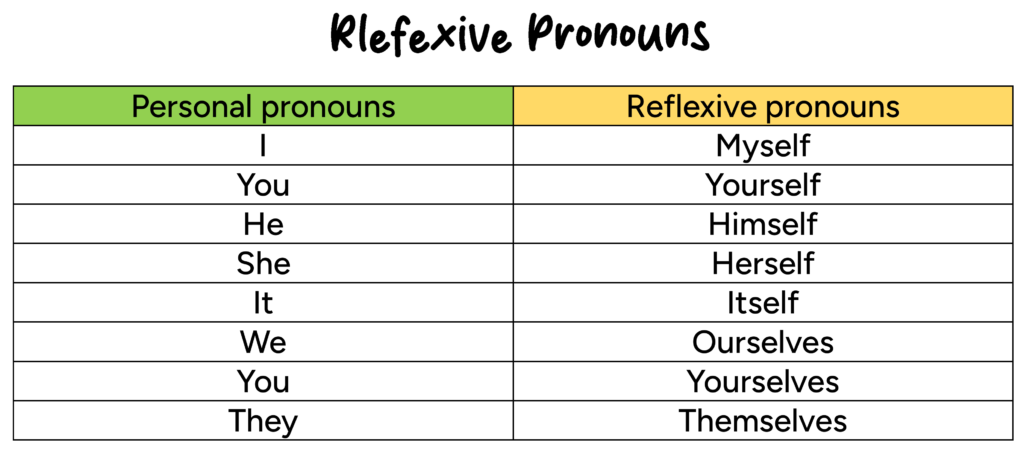What are pronouns?
Pronouns are words used to replace nouns and avoid repetition.
Types of pronouns
1-Personal pronouns refer to people or things that have been already been mentioned before; they indicate number, person, gender and case (subject and object pronouns).

Subject pronouns are a type of personal pronouns used to replace the subject of a sentence: I, you, he, she , it, we, they.
I want to sing.
Do you want to go outside?
He is not feeling well.
She’ll send the email.
It is very cold outside.
We’re having a meeting tomorrow.
They are at school right now.
Object pronouns are a type of personal pronouns used to replace the object of a sentence: me, you, him, her, it, us, them.
Can you call me?
They want to help you.
I saw him yesterday.
We haven’t seen Elizabeth in a while. Let’s call her.
I found it.
It scared us.
Where are my earrings? I took them.
2-Possessive pronouns are pronouns used to indicate possession; they replace nouns or noun phrases.
This notebook is mine.
Are those albums yours?
The bike is his.
The shoes are hers.
The car is ours.
The bags are theirs.

3-Demonstrative pronouns are pronouns that indicate specific people or things. They are followed by a verb and can stand alone; they replace nouns.
This is my favourite singer.
That is my friend.
These are my old books.
You can draw those.
4-Interrogative pronouns are pronouns used to ask questions: who, whom, what, which, whose.
Who refers to people: subject.
Who won the race?
Whom refers to people: object.
Whom did you invite to the graduation party?
What refers to something: subject / object.
What is your favourite TV show?
What did you order?
Which refers to people / something: subject / object.
Which is their house?
Which is the best option?
Whose refers to people / something: subject / object.
Whose is this rose?
Whose is this cellphone?
5-Relative pronouns are pronouns that introduce relative clauses in a sentence: who, which, that, whom, whose.
Who refers to people.
The girl who won the race is my cousin.
Whom refers to people.
The boy whom I met today is my neighbour.
That refers to people / something.
The dress that I bought is yellow.
Which refers to something.
The pencil which is on the table is hers.
Whose refers to people / something.
The man whose wallet was stolen reported it to the police.
6-Reflexive pronouns are pronouns that are used to reflect the action of the verb onto the subject itself.
I cut myself while playing with the scissors.
You should be proud of yourself.
He came himself to the store.
Lucy bought herself a new pair of boots.
The TV turned itself on.
We served ourselves dinner.
Take care of yourselves.
They hurt themselves.

7-Emphatic pronouns are the same as reflexive pronouns but the difference is that emphatic pronouns are used to emphasize a noun or pronoun in a sentence. If you decide not to use them, it will not affect the sentence; they are sometimes placed before the verb.
I myself cleaned the tables.
You solved the problem yourself.
The teacher himself organized the event.
Gracie herself fixed the computer.
The house itself is creepy.
We ourselves painted the house.
You yourselves can make a big difference.
They created a new app themselves.
8-Indefinite pronouns are pronouns used in a non-specific way to refer to nouns.
Singular indefinite pronouns
Anybody: can anybody help me?
Anyone: does anyone know the answer?
Anything: you can pick anything you want.
Another: I have another good option.
Each: they need to remember each name.
Everybody: everybody came to the party.
Everyone: everyone is invited to the picnic.
Everything: everything is perfect.
Either: you can choose either biscuits or muffins.
Enough: I have enough money to buy a new house.
Less: we need to eat less food.
Little: there is little juice left in the fridge.
Much: I don’t have much time.
Neither: neither options are suitable.
Nobody: nobody heard me.
No one: no one came to the meeting.
Nothing: there’s nothing you can say to change what happened.
One: one of the kids didn’t eat.
Other: what is the other option?
Somebody: somebody called her last night.
Someone: someone is waiting for you.
Something: something is not right.
Plural indefinite pronouns
Both: you can choose both.
Few: there are few options.
Fewer: there are fewer chairs in the classroom.
Many: many fans are at the stadium right now.
Others: there are others like me.
Several: there are several law suits against the school.
Singular and plural indefinite pronouns
All
All the information has already been provided.
All the students have arrived.
Any
Do you have any brush I can borrow?
Are there any movies left to see?
More
I need more information.
We need more people.
Most
Most of the work has been stolen.
Most of the citizens have donated.
None
None of the money was given to me.
None of the employees were in the office.
Some
There is some water on the counter.
I need to write some letters.
Such
Such a hot day.
Such beautiful memories.
9-Reciprocal pronouns are used to express a mutual relationship between two or more people or things; the two subjects must be doing the same action.
Each other
They love spending time with each other.
They didn’t use to hate each other.
The dogs were playing with each other.
One another
Selena and Jessica confided in one another.
The cousins used to borrow dresses from one another.
We would always encouraged one another.
Other parts of speech: